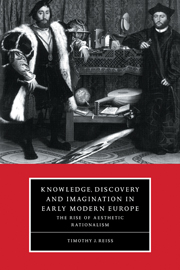Book contents
- Frontmatter
- Contents
- Prologue and acknowledgements
- A note on the text
- Introduction
- Part 1 Problematizing the language arts
- Part 2 Passages
- Part 3 Mathematics, music and rational aesthetics
- 5 Quadrivial pursuits
- 6 Bridging effects
- 7 Musical elaborations
- 8 Well-tempered imagining
- Bibliography
- Index
- CAMBRIDGE STUDIES IN RENAISSANCE LITERATURE AND CULTURE
6 - Bridging effects
Published online by Cambridge University Press: 01 February 2010
- Frontmatter
- Contents
- Prologue and acknowledgements
- A note on the text
- Introduction
- Part 1 Problematizing the language arts
- Part 2 Passages
- Part 3 Mathematics, music and rational aesthetics
- 5 Quadrivial pursuits
- 6 Bridging effects
- 7 Musical elaborations
- 8 Well-tempered imagining
- Bibliography
- Index
- CAMBRIDGE STUDIES IN RENAISSANCE LITERATURE AND CULTURE
Summary
For the relation and distinction of experience and history, rule and method were surely not foreign, for instance, to what Henry Wotton had in mind when he distinguished, presumably in the 1620s, between two ways of conceiving architecture or any art, ‘the one historicall’, the other ‘Logicall, by casting the rules and cautions of this Art into some comportable Method’. l It is not that a person like Wotton intended by this second anything stricto sensu ‘mathematical’, but we certainly find here a clear distinction between a method of pedagogy and one of discovery. Equally to the point, what a Wotton meant by ‘Method’ was the result of debates for which, by 1620, the arts that had been of the quadrivium now offered the firmest ground. We can already see how this distinction adopted conclusions of a nearly twocentury- long discussion. But the issues I want to dwell on in the last three chapters lie in the fact that for the traditional reasons suggested, the early stress on mathematics (arithmetic, geometry, trigonometry, algebra), as well as new discoveries in astronomy, were directly bound to debate in music, the fourth mathematical art (the case of the Galileis, father and son, being exemplary).
In turn – and this will be of increasing importance to my discussion – the bond linked matters right away to debates over the nature of the passions, the functioning of the senses, what is and is not beautiful, moving, attractive, and why and how. These links, not any vague philosophical influence, justify the phrase ‘Cartesian aesthetics’ that I have used elsewhere, and my setting Descartes as the end point of the resent study, as I shall.
- Type
- Chapter
- Information
- Knowledge, Discovery and Imagination in Early Modern EuropeThe Rise of Aesthetic Rationalism, pp. 155 - 168Publisher: Cambridge University PressPrint publication year: 1997



